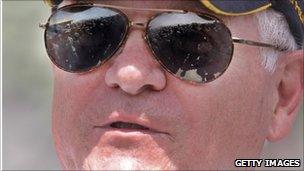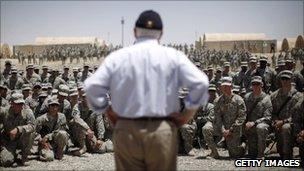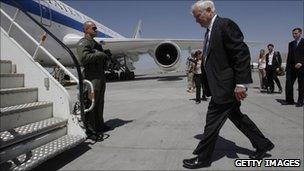Secretary of Defence Robert Gates's last battle
- Published
- comments

After serving presidents Bush and Obama, Robert Gates is retiring at the end of the month
Robert Gates, external is fighting his last battle. Few defence secretaries have been so widely praised as a wise and calm adviser. After serving both George W Bush and Barack Obama, he is now finishing up a farewell tour.
Whether saying goodbye to soldiers in Afghanistan, or Nato colleagues in Europe, his message, external is the same, and it is meant to be heard in the White House.
From Nato headquarters he said: "Having arrived in Brussels after my 12th and last visit to Afghanistan as secretary of defence, I shared my view that we are making substantial progress on the ground.
I also reiterated my belief that these gains could be threatened if we do not proceed with the transition to Afghan security lead in a deliberate, organised and co-ordinated manner.
"Even as the United States begins to draw down in the next month, I assured my fellow ministers there will be no rush to the exits on our part. And we expect the same from our allies."
This is a plea to the president not to pull out of Afghanistan too fast. When President Obama announced in 2009, external he was sending 30,000 more troops to Afghanistan, he also said they would start coming home in 18 months time. In the very next sentence.
That time is now. The withdrawal is due to begin next month. Of course the president will keep his promise. But the big argument in Washington is over the size and significance of the withdrawal.
The military doesn't want it to be too large. Perhaps around 5,000 would be their upper limit.
Seeds of doubt
One retired General, Jim Dubik, external, who helped mastermind the surge in Iraq and is now a senior fellow at the Institute for the Study of War, external, told me that for eight years America adopted the wrong strategy, counter-terrorism, which allowed the Taliban to grow.
Now he believes it is on the right track with the more expensive, more intensive, counter-insurgency strategy. For many in the military the new strategy has barely been given a chance, and Gen Dubik believes if too many troops come home it would threaten what's been achieved.
"If it got to be 7,500, then we're starting to put at risk the momentum we built the last 18 months. We're starting to hand the enemy a respite that we don't need to give the enemy, that they will for sure take advantage of.
"We're starting to put in place the seeds of doubt, and the seeds of doubt are serious because real or not, the perception in Afghanistan is that the US and the west had abandoned it before, and we're going to abandon it again."
But times they are a-changing. As one commentator put it, external, when Darth Vader is dead, the movie is over.
Bin Laden's killing makes people think, the job is done. Not least, President Obama.
Speaking on Hearst TV he said: "By us killing Osama Bin Laden, and stabilising much of the country of Afghanistan so that the Taliban can't take it over, it's now time for us to recognise that we've accomplished a big chunk of our mission and that it's time for the Afghans to take more responsibility."

Robert Gates has cautioned that a rushed exit from Afghanistan would be a mistake
The latest opinion polls, external are all moving in one direction. The latest from CBS, external, in favour of withdrawal, was the highest figure they've ever recorded. Some 178 Democrats in the House, many of whom never liked the surge anyway, voted for a strict timetable, external to bring the troops home. They only just lost.
From the moment that Obama announced both surge and a return home in virtually the same breath, it was fairly clear that this was a policy made to fit the political cycle. He couldn't quite say "Let's give it a shot. One last heave, and that's your lot."
Fatigue
But that was the implication and it was good politics in his first year in office. He gave the military the strategy they wanted and a troop increase that made them happy. New Democratic presidents tend to side with the military to show they're not soft on defence.
The surge countered the notion that Obama was weak on national security. Now it is a different matter.
Veteran Democratic strategist Peter Fenn told me: "I think there is a fatigue out there now for nation building. There is a fatigue out there for the United States as a policeman of the world.
"There is a fatigue out there for 'we are going to pay the bills'. So the American people are saying we want to turn inward, we want to solve our own problems, and help the folks here who are unemployed and whose houses are underwater.

Robert Gates has made his last trip to Afghanistan as Secretary of Defence
"If the president does not go ahead with his plan and withdrawal, and give people the sense that he's turning this over to the Afghanis, then he's going to face problems here at home, and it's not just from the left flank, it's going to be, as a result of battle fatigue."
It is easy to portray this as cynical politicians versus military men who know what's what. But it is also about whether nation-building, or even nation-building-'lite' can ever work in a country like Afghanistan.
Some, like the commentator David Rothkopf, external, think Mr Gates deserves to lose his last battle.
The coming weeks will be a real test for the president. The signals he sends are likely to infuriate either his natural supporters or his generals.